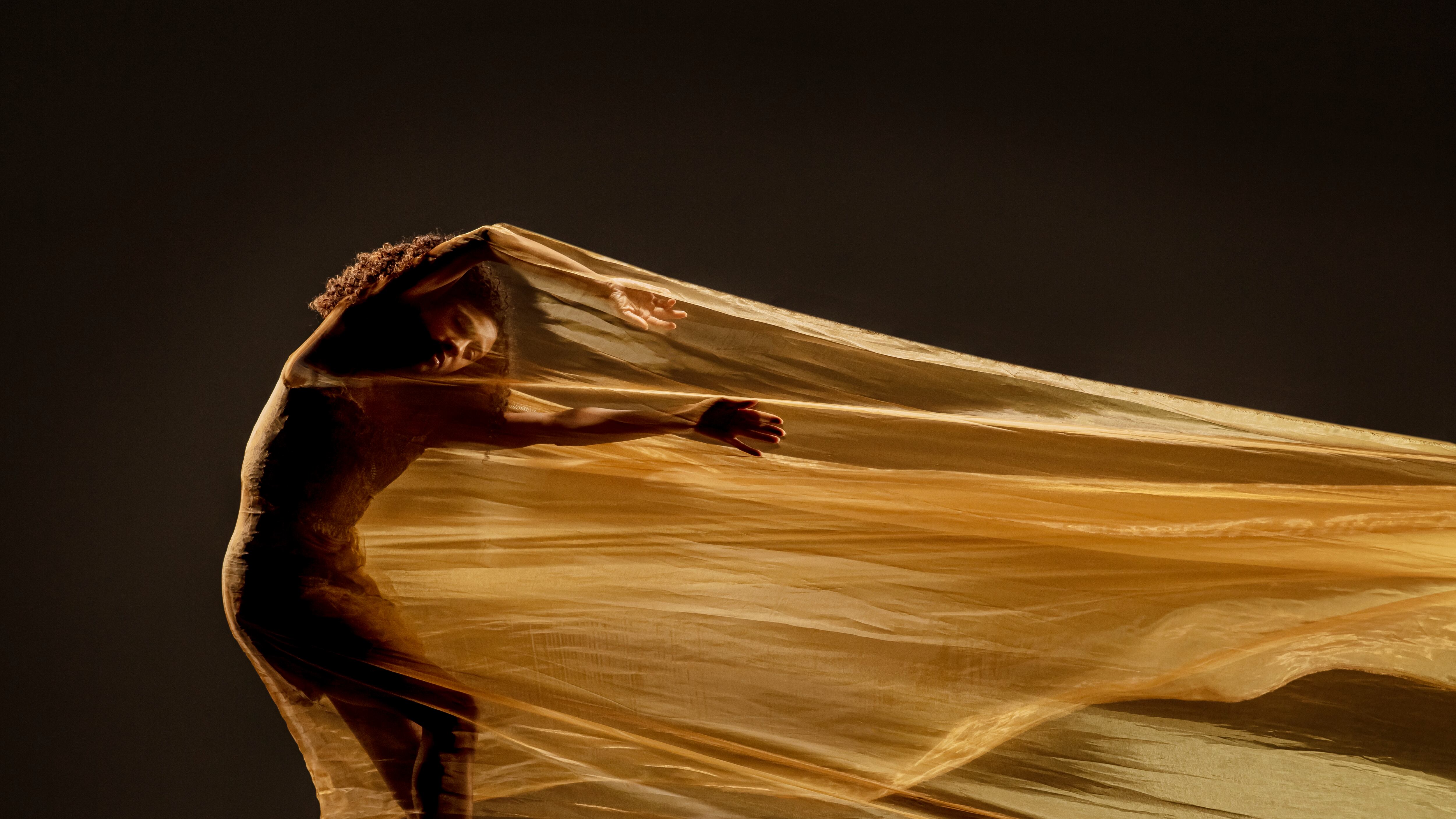In his bio, choreographer Alonzo King is said to create works “by the manipulation of energies that exist in matter through laws, which govern the shapes and movement directions of everything that exists.” His work of choreography Deep River, presented by White Bird at the Newmark Theatre on Nov. 21–23, unfurled like an energetic map, presenting dancing bodies that could be likened to a “family of souls,” to quote the program. During opening night’s performance, the Alonzo King LINES Ballet dancers moved through a series of states, ranging from frenetic, downtrodden, and longing to absurd, joyous, and exultant.
This performance reflects a three-year period of research and craft in “unusual settings” brought about by the pandemic. Within the folds and junctures of Deep River, dancers are released from the expectation to embody characters or archetypes—tropes that are perhaps too easily overidentified with and projected upon by an audience. Instead, the cast inhabited a trajectory of frequencies for the audience to trace and absorb, culminating in the essence of spiritual and relational triumph against all odds.
The performance opened in silence as the curtain raised to reveal the cast of dancers on stage, all facing different directions. They began a choreography of flourishing arms and pointed gestures, balletic in nature, moving in and out of formations and allowing spectators to grow familiar with each cast member. This opening, called “KADDISCH,” featured the emotional music of composer Maurice Ravel. The program stated that “spiritual music from the Black and Jewish traditions was selected to address the power of inspiration during difficulty,” harking back to the history of African American spirituals that feature seminal stories from the Hebrew Bible.
During a section called “TRANSITION,” Adji Cissoko hung limp in Shuaib Elhassan’s arms, as he carried her slowly across stage, pausing to find the floor and then standing and hoisting her loose limbs to complete their journey.
Throughout the beginning Deep River sequence, the dancers stirred up anxious energy in waves with their hyperspecific movements, complemented by their well-considered costumes. Many cast members began the show in sheer tunics, while others wore long black skirts. Portland-born dancer Babatunji wore sparkling brown pants, drawing special attention his way. The dancers continued to subtly change costumes between movements, dawning sheer, velvety, lacy, flowing and even feathery materials according to a logic I could not follow but to aesthetic effect I came to value. Their various costumes—designed by Robert Rosenwasser (the company’s executive director, creative director and co-founder) and constructed by Joan Raymond and Shannon Maxham—helped highlight the uniqueness of each dancer, distinguishing them for more ease of appreciation.
Striking moments during the performance included a valiant solo by Theo Duff-Grant set to music by composer Jason Moran and lyrics sung by Lisa Fischer—both of whose music featured heavily across Deep River. During Duff-Grant’s solo, the rest of the company made their way behind a sheer scrim, creating shadowy figures against a pale background. They moved slowly and articulately, juxtaposed with Duff-Grant’s rigorous dancing, letting the audience apprehend the nuance of their contributions. Company dancers faded into the wings and then emerged downstage, walking toward Duff-Grant incrementally and prompting him to roll away. This strong energetic shift brought the background to the fore, as if to indicate the turning of tides.
In another motif, entitled “LAUGHING PAS,” dancers Marusya Madubuko and Joshua Francique partnered in a pas de deux full of unexpected antics. From the start, they conjured up hysterical laughter, with open mouths and lively eyes, until their laughs felt almost authentic, epitomizing Deep River’s “call to be fanatically positive.” The audience clapped and the dancers’ movements grew less balletic and more lax and experimental. At one point, Madubuko jumped on Francique’s back, and they bounced together in this absurd configuration. This duet offered relief from the intense specificity of the prior dancing, and seemed to delight the audience.
As the performance approached its climax, Babatunji danced an exhilarating solo, a section called “LIFT EVERY VOICE AND SING” with music by James Weldon Johnson and J. Rosamond Johnson. Babatunji blanketed the stage in stunning movement, venturing out of ballet vocabulary to move like he was walking on his hands across stage. This was followed by the section “DEEP RIVER” featuring the company performing to the traditional African American spiritual. The dancers formed two lines and began crossing between one another, an intersecting stream of souls giving space for one another to pass through.
The performance concluded unexpectedly with a compelling pas de deux featuring the delicate stylings of an emotional Adji Cissoko intricately cavaliered by Shuaib Elhassan. The two tangled their arms together and unfurled them, with Cissoko finding moments of ethereal extension. While she had begun the performance limp in Elhassan’s arms, Cissoko now sparkled and floated with Elhassan’s expert support. Suddenly, their dance ended, and the partners faced the audience smilingly to take their bows. The rest of the company joined for bows onstage, eliciting a standing ovation from the audience. Alonzo King LINES Ballet infused the Newmark Theatre with spiritual force this evening, drawing on history and tradition as a reminder that inspiration beckons even during the most difficult of times.

